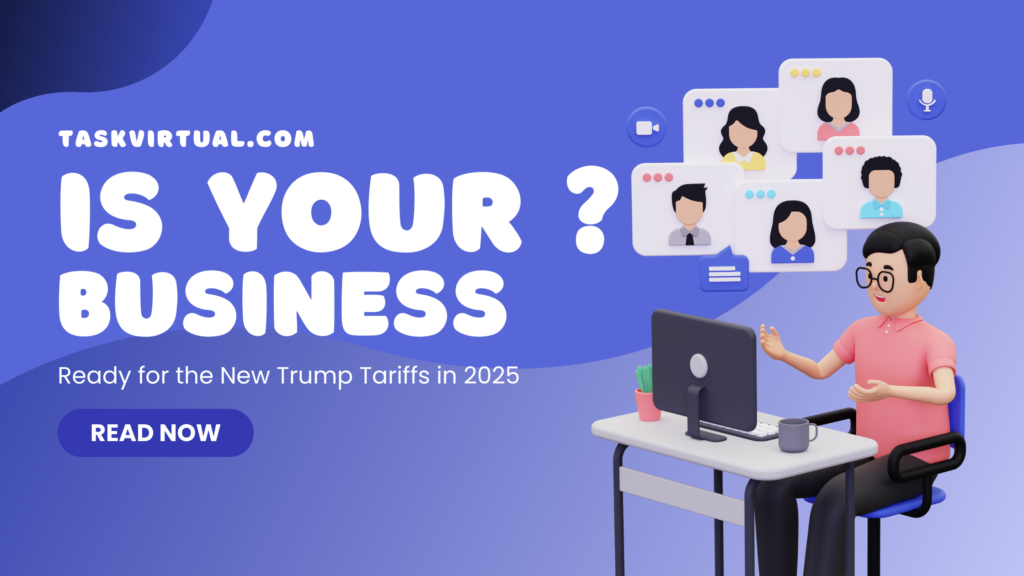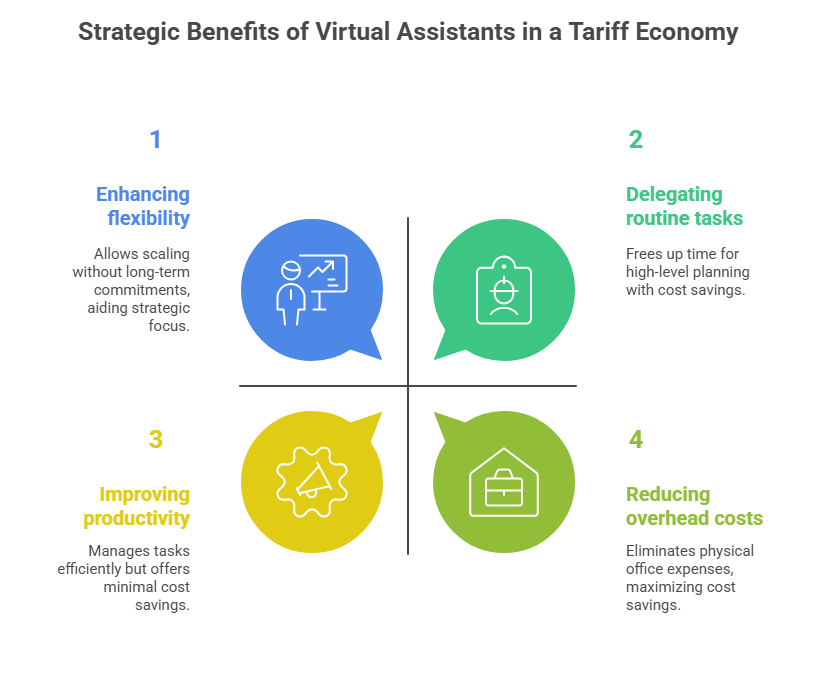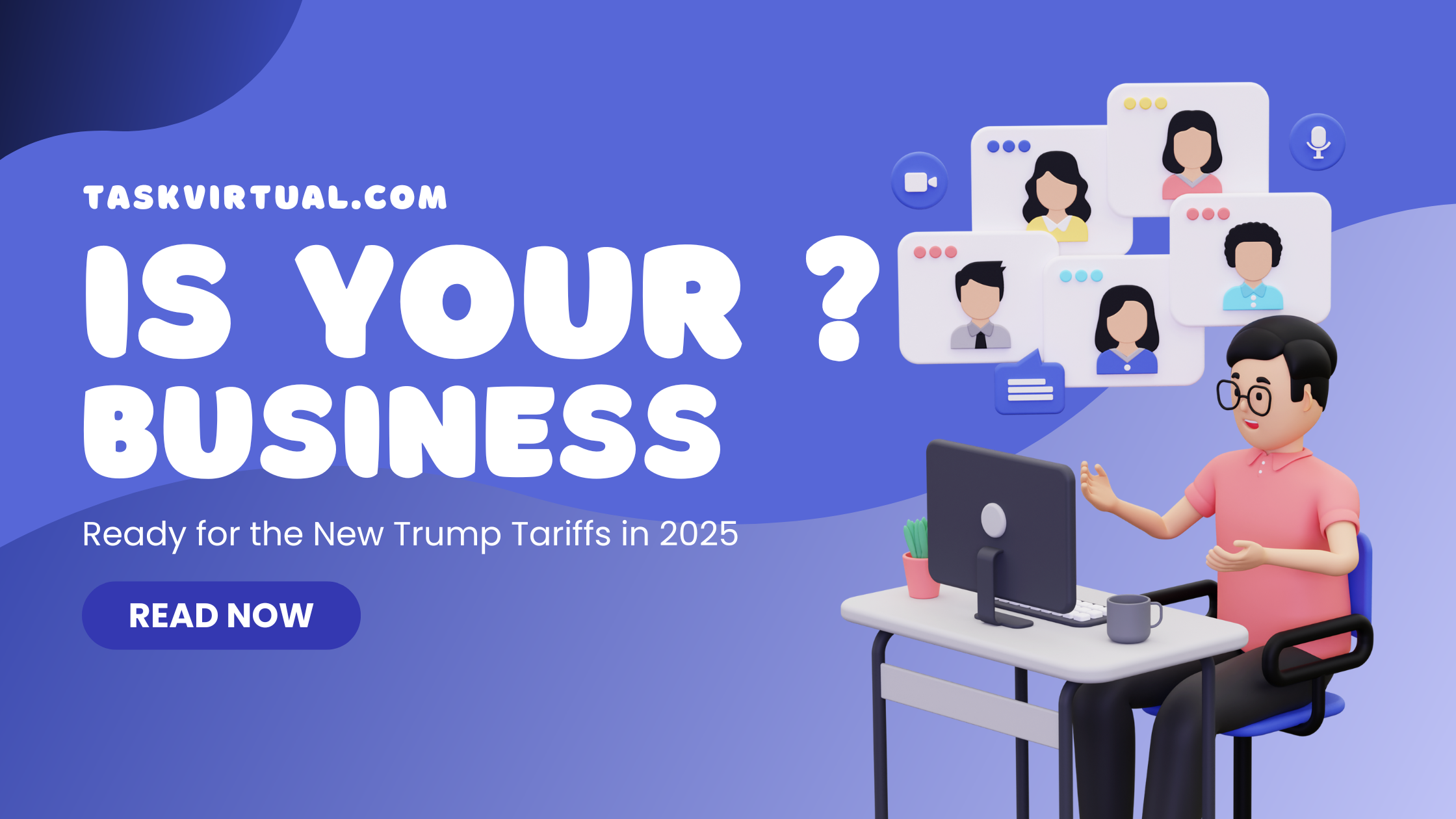
Is Your Business Ready for the New Trump Tariffs in 2025?
The return of aggressive trade policies under Trump’s leadership in 2025 has reignited concerns about global commerce. For small to mid-sized businesses especially, the ripple effects of the Trump tariffs 2025 are impossible to ignore. From higher operational costs to supply chain disruptions, the implications are wide-ranging—and getting worse as China retaliates against Trump’s tariffs with counter-tariffs on US goods.
This blog explores how the latest tariff wars could affect your business, how they tie into the broader US China trade war, and how outsourcing some of your operations to a Virtual Assistant (VA) may provide an edge during economic uncertainty.
The Tariff Tensions Are Back—and Bigger Than Ever

In early 2025, Trump announced tariffs against Canada, Mexico, and China, reigniting a familiar economic battleground. This aggressive stance includes steep duties on imported steel, aluminum, semiconductors, electric vehicles, and even some consumer goods. Businesses that rely on international suppliers are bracing for impact.
According to the Wharton Budget Model, the long-term effects of these tariffs could shrink the U.S. GDP by nearly 6% and reduce average wages by 5%, hurting both employers and employees.
The Trump China tariff policies specifically target electronics and manufactured goods. These are sectors that U.S. businesses heavily rely on—whether it’s raw materials for production or finished goods for retail. A new wave of trump mexico-canada china tariffs is now forcing companies to revisit their sourcing strategies, pricing models, and workforce deployment.
China and Others Are Fighting Back
The global response has been swift. China retaliates against Trump’s tariffs with counter-tariffs on US goods, targeting key American exports like soybeans, aircraft, and automobiles. These countermeasures not only restrict market access for U.S. producers but also raise operational costs for domestic businesses.
Thomson Reuters reports that many companies are now rethinking their logistics chains altogether. There is a growing trend of “friendshoring”—moving operations to allied nations—but this process takes time and often costs more in the short term.
Businesses caught in the crossfire are also experiencing longer lead times and unstable inventory management. This uncertainty makes it difficult to maintain customer satisfaction or plan growth.
Hidden Costs and the Long-Term Impact
Aside from import duties and supply issues, tariffs bring other hidden costs. Many companies are now spending more on:
-
Legal consultation for compliance
-
Market research to identify alternative suppliers
-
Currency hedging due to international financial instability
According to report, 43% of small businesses already reported revenue losses due to previous tariffs. With the return of these policies in 2025, the burden is expected to grow.
Smaller companies that can’t afford to outsource manufacturing or pass costs onto customers are especially vulnerable. For them, finding cost-effective operational solutions is no longer a luxury—it’s a necessity.
Why Virtual Assistants Make Business Sense in a Tariff Economy

This is where Virtual Assistants (VAs) can help. VAs are remote professionals who can handle administrative, technical, marketing, and customer service tasks at a fraction of the cost of full-time employees.
During an economic downturn or tariff-fueled uncertainty, a VA can:
1. Reduce overhead costs:
No need for physical office space, benefits, or taxes
2. Improve productivity:
VAs can manage calendar scheduling, customer service, and order processing efficiently
3. Allow business owners to focus on strategy:
Delegating routine work frees up time for high-level planning
4. Enhance flexibility:
Scale up or down as needed without long-term commitments
By replacing or supporting in-house staff with trained VAs, businesses can maintain efficiency and service quality while avoiding rising costs linked to global disruptions like the US China trade war.
TaskVirtual: Your Strategic Partner in Uncertain Times
One standout option in the VA endeavours is TaskVirtual. Here’s why they’ve become the go-to resource for business owners navigating global instability:
-
Expert consultation on AI-powered tools for browsing, sourcing, and competitor analysis
-
Affordable pricing, ranging from just $3.12/hour to $14.99/hour
-
Proven credibility, with 364 verified reviews and an average 4.7-star rating on top VA platforms
Whether you’re managing eCommerce, SaaS, logistics, or consulting, TaskVirtual’s professionals are trained to deliver fast, secure, and scalable solutions.
From researching alternative suppliers to managing international customer queries, a TaskVirtual VA could save you both time and thousands in overhead—just when every dollar counts.
Adapting to the New Normal

The broader implications of the Trump tariffs 2025 go beyond product pricing. They’re redefining how global commerce operates and where businesses can expect growth. Being proactive, rather than reactive, is critical in this environment.
Here are a few strategic steps business owners should consider:
1. Audit your supply chain:
Identify tariff-vulnerable items and seek alternatives
2. Reassess your staffing model:
Consider a hybrid team of in-house and virtual support
3. Diversify your markets:
Reduce reliance on countries with unstable trade relationships
4. Automate where possible:
Use AI tools and VAs to enhance efficiency
5. Stay informed:
Policy shifts are constant—subscribe to government and trade alerts
As the US China trade war continues to shape the global economic landscape, adaptability becomes your best asset.
Conclusion: Survive and Thrive in a Tariff-Tangled Economy
With the Trump China tariff plans reemerging and trump mexico-canada china tariffs shaking up North American trade, businesses must take decisive action to protect their bottom line.
Embracing Virtual Assistants is one smart way to reduce fixed costs while staying agile and competitive. Platforms like TaskVirtual offer a compelling combination of affordability, expertise, and reliability—perfect for weathering the next storm.






